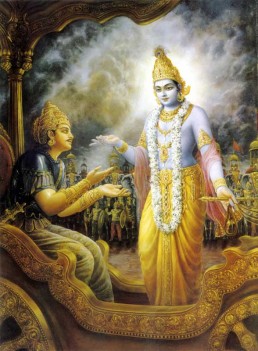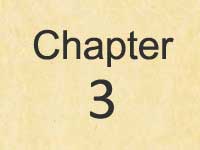
कर्मयोग
Karma Yoga - Path of Selfless Service
In this chapter, the Lord teaches the importance of action and explains why and how one must act in the world so that the mind and intellect are purified and relieved of their false attachments, thereby making them receptive to the Self-knowledge that was emphasized in the previous chapter. Below are the main themes of Chapter 3:
Verses 1 - 7
Introduction
Verses 8 - 20 (First Line)
Karmayoga
Verses 20 (Second Line) - 29
The role of a wise person
Verses 30 - 35
Summary
Verses 36 - 43
The problem of desire and its solution
Gita Chapter 3 - 43 Verses
Chapter 3 - 43 Verses
Commentary by Swami Paramarthananda
Background
In the second chapter, the Lord praised Self-knowledge right from the beginning (11, 21, 46) and criticized the karma-kāṇḍa of the Vedas (42 to 45). Thereafter, He asked Arjuna to take to karma (48). This creates a serious doubt in Arjuna and the third chapter begins with this doubt.
Arjuna asks—“Oh Lord! You seem to confuse me by contradic-tory statements. Tell me one—knowledge or karma—which will lead me to Mokṣa” (1, 2).
Bhagavān answers that there are two lifestyles called karma-yoga-niṣṭhā (social life) and jñāna-yoga-niṣṭhā (secluded life). One can choose anyone of them as a householder or as a monk (3).
(But there is no choice between karma and knowledge. Whatever lifestyle one chooses, one has to follow relevant karma for purity and then pursue knowledge to discover the freedom that is one’s true nature.
Of these two lifestyles, Kṛṣṇa gives preference to social life through-out the Gītā. In the Upaniṣads we find the latter emphasized. Choice depends on the maturity of the seeker.)
From the 4th to the 7th verse, Kṛṣṇa condemns inaction and praises an alert and active life. Inaction should be avoided because:
1. Neither purity nor knowledge can be achieved by that (4);
2. Desires force one to act and inaction will be a suppression (5);
3. A mind without occupation will be idle. It will brood over sense-pleasures. Such a hypocritical mind will soon fall (6). (Also refer II-62, 63)
From the 8th to the 20th verse (1st line), Bhagavān deals with one of the most beautiful and important topics of the Gītā viz. karma-yoga.
Having created the world and the intelligent human beings, the Lord Himself advocated (in the Vedas) the way of life which is karma-yoga. By following this, material and spiritual progress can be attained (10 to 14).
Since it is the teaching of the Lord, the Master of the universe (Svāmī), human being has to take it as a command (niyatam) and obey it as a servant (bhṛtya) of the Lord (8).
When we follow the teachings of the Lord, it becomes a gesture of our appreciation for all the gifts and blessings that the Lord has be-stowed upon us. Thus, our work becomes a worship or loving offering (yajña) to God. It purifies the mind also (9, 13).
Lastly, karma-yoga is necessary to maintain the harmony of the universe upon which we are dependent. The working of the universe being a cyclic process, with the human beings as its important link, one must be aware of one’s responsibility (duty). Thus, karma-yoga is only the duty (kāryam) of a responsible citizen of the world. One who does not discharge it proves himself/herself to be an immature human being (14 to 16).
Thus, karma-yoga is to be pursued because:
- It contributes to material and spiritual progress (yoga).
- It is the commandment (niyatam) of the Master of the universe.
- It is our grateful offering (yajña) to the Lord, acknowledging His gifts.
- It is the only way of maintaining the harmony (dharma).
(In this chapter, Bhagavān does not talk about kāmya-karma — actions to fulfill the desires. This shows that true karma-yoga does not involve kāmya-karma. Hence a seeker must gradually reduce kāmya-karma, even to become a true karma-yogī.)
Karma-yoga ultimately leads one to liberation through the stages of purity (śuddhi), enquiry (vicāra) and knowledge (jñānam) (17, 18). Kṛṣṇa concludes the topic by citing the example of Janaka who success-fully pursued knowledge while remaining in karma-yoga-niṣṭhā (social life) (20, 1st line).
From the 20th (2nd line) to the 29th verse, the Lord talks about the role of a wise man in the society, taking Arjuna as one. Any per-son with a higher status or knowledge (śreṣṭha), can influence others positively or negatively. Hence, even though Arjuna might not benefit from this war, he has to fight as kṣaṭriya’s duty and set an example to others. Else, he will be responsible for anarchy in his own time as well as in the future (22 to 25).
Thus, both the wise and the ignorant should act — the former for teaching others, and the latter, for purity. The only difference is that the former will be detached while the latter won’t be (27 to 29).
The 30th verse summarizes karma-yoga, giving five conditions:
- Keep the spiritual goal.
- Offer all actions to the Lord.
- Don’t be concerned about the result.
- Be free from possessiveness; and
- Be calm.
One who follows karma-yoga reaches the goal of life and the other is lost (31, 32).
Likes and dislikes (rāga-dveṣa) born of habits (vāsanas) pull a person astray. Still, a person should not go by what he likes to do but what he has to do (duty), even if it involves difficulties (33 to 35).
As an answer to Arjuna’s question (36), Kṛṣṇa elaborately dis-cusses the problem of kāma-krodha (rāga-dveṣa). They are the real enemies of a seeker (37). Clouding the knowledge, they force a person to run after endless insatiable desires and take away all the chances of peace and progress (38, 39). The senses, the mind, and the intellect are the base of desires. They have to be taken care of (40, 41).
(Durvāsanās should be replaced by śubhavāsanās by practice. False values should be replaced by right ones through discrimination.)
Once kāma becomes weak, one can discover the Ātmā, which is beyond the senses, the mind, and the intellect and thus destroy kāma for good (42, 43).
Thus the third chapter discusses the following topics mainly:
- Introduction: 1 to 7
- Karmayoga: 8 to 20 (1st line)
- The role of a wise person: 20 (2nd line) to 29
- Summary: 30 to 35
- The problem of desire and its solution: 36 to 43
Since karma-yoga is the main topic, this chapter is called Karma-yoga.

